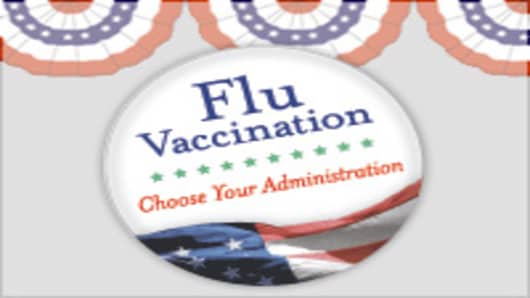Talk about timely direct-to-consumer advertising. Last week ,I blogged about AstraZeneca's new ad campaign for FluMist and its tie-in with the back-to-school shopping season.
Well, now the drugmaker is getting political. To coincide with the official start of the presidential campaign season and the Democratic National Convention, AZN (or its ad agency) has cleverly, creatively taken a new Web site live with the tagline, "Choose Your Administration." Get it? As in, the administration of your flu vaccine -- a traditional shot in the arm, or FluMist which is sprayed up the nose.
But pharma has a more significant connection to the election. At speaking engagements and in cocktail party conversations, this factoid always seems to come as a surprise. I've blogged about it several times in recent months, but given the calendar I thought this was a good time to revisit it. And the Center for Responsive Politics, as it turns out, has updated numbers.
As of last Wednesday, the pharmaceuticals/health products industry has given more than $900,000 to Sen. Barack Obama. And Sen. John McCain has moved into third place with $442,000 in contributions.
And all told, so far, the drug companies, which traditionally favor Republicans over Democrats, have given three times as much money to Sen. Obama and Sen. Hillary Clinton combined, than it has to the presumptive GOP nominee.
Over the past several months I'd also called attention on at least a few occasions here and on air to the fact that Pfizer Chairman and CEO Jeff Kindler, the leader of the world's biggest drug company, is/was a supporter of Sen. Hillary Clinton. His candidate may not have won the nomination, but unlike some of Clinton's supporters Kindler is not abandoning the party. Ed Silverman of the Newark Star-Ledger, on his blog "Pharmalot," last week wrote about Kindler's role at the Democratic convention.
Democrats, generally speaking, have been less friendly to pharma than Republicans. Some pundits say the money flow is symbolic of a recognition by the industry of who it believes is the most likely to win the election and that the higher level of contributions is politically savvy -- that they might guarantee the companies a place at the table in the inevitable healthcare reform effort.
Other pundits, including the Center for Responsive Politics, say the dollars should be an indication to voters that the harsh anti-pharma rhetoric they might hear from a Democratic candidate on the campaign stump may not ultimately be the way he/she votes when push comes to shove.
Choose your administration.
Questions? Comments? Pharma@cnbc.com


